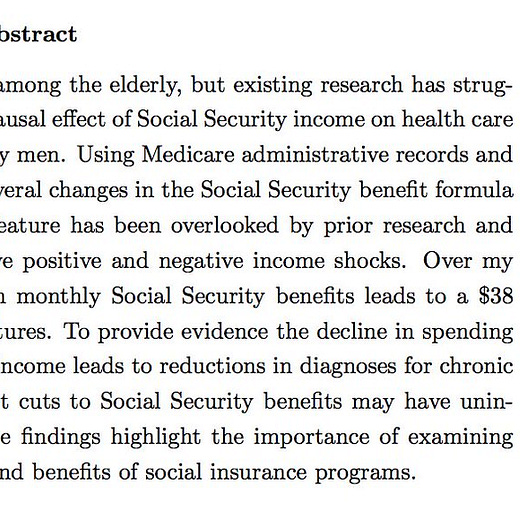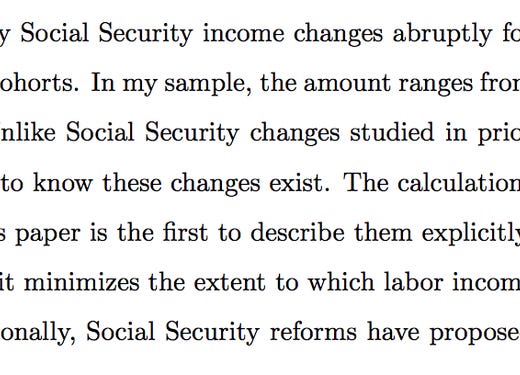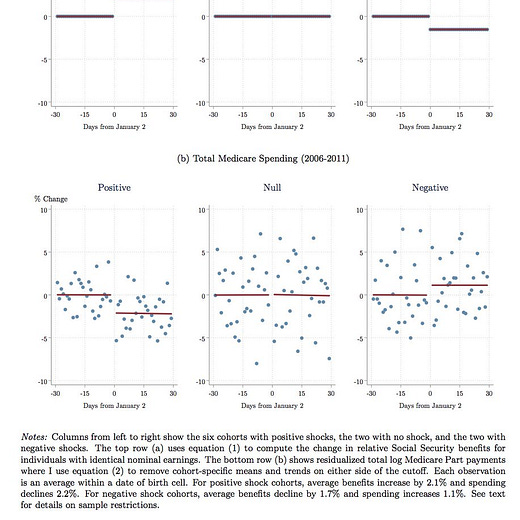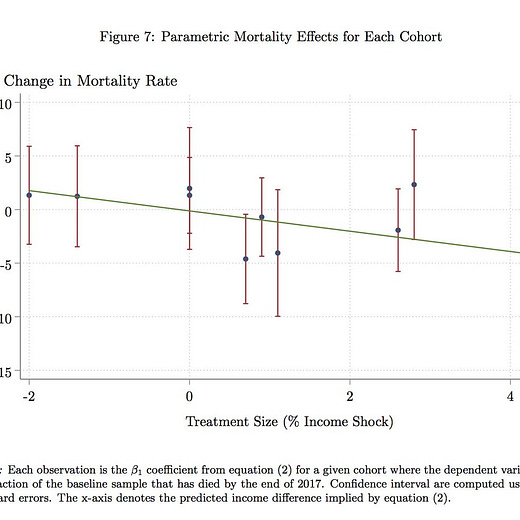Best of #econtwitter - Week of July 18, 2021
Jul 19, 2021
Welcome readers old and new to this week’s edition of Best of Econtwitter. Thanks to those sharing suggestions, over email or on Twitter @just_economics.
Paper summary threads

Pedro H. C. Sant'Anna@pedrohcgs
🦶🦶🚨New DiD Paper🚨🦶🦶
What if treatment is continuous not binary? What parameters can you estimate under what assumptions? What about two-way fixed effects regressions? What about staggered timing?
Brant Callaway, @agoodmanbacon and I dive in here:
arxiv.org/pdf/2107.02637…

6:06 AM · Jul 16, 2021
309 Reposts · 1.25K Likes

Alexander Berger@albrgr
This is an IMO super impressive job market paper, working with tons of Social Security and Medicare data to find that ~randomly getting $100 more of SS reduces medicare spending by $38: jberman72.github.io/Jacob_Berman_J…
Also see mortality decrease(!) tho I can't figure cost per life saved




8:49 PM · Jul 11, 2021
52 Reposts · 180 Likes

Shengwu Li@ShengwuLi
Econ perspective: People make choices to satisfy their preferences.
Psych perspective: People adapt their preferences to justify their choices.
Here's a theory that combines them. (A new working paper joint with Erik Eyster and Sarah Ridout.) arxiv.org/abs/2107.07491🧵

1:42 AM · Jul 16, 2021
82 Reposts · 467 Likes

Nuno Palma@nunopgpalma
In 1750 Portugal had an output per head higher than France or Spain. One century later it was Western Europe's poorest country. Why? Find all about it in this new working paper, joint work with the extraordinary @dkedrosky (watch this kid, he's going far):
warwick.ac.uk
The Cross of Gold: Brazilian treasure and the decline of Portugal
10:40 AM · Jul 16, 2021
81 Reposts · 337 Likes
^another thread from coauthor Kedrosky

Robert Dur@DurRobert
Dishonest behavior is contagious:
Supermarket theft increases by 16% after a local corruption scandal is made public.
Evidence from 🇮🇹: barcelonagse.eu/research/worki… by Giorgio Gulino @giorgio_gln and Federico Masera @masera_federico


4:00 PM · Jul 14, 2021
52 Reposts · 240 Likes

Devin Pope@Devin_G_Pope
Fascinating new paper in AER: Insights shows that adoptive moms experience a similar earnings penalty as biological moms. Suggests biological factors such as child birth and breastfeeding are less important for earnings penalty than factors related to culture/preferences/norms.

6:08 PM · Jul 14, 2021
129 Reposts · 510 Likes
^this figure has gone mildly viral ~once a month since WP posted (understandably)

Luis Aguiar@luisaguiarw
Can we measure platform bias in the music industry? We test for bias in playlist rankings at Spotify and provide an empirical approach that is applicable in other platform contexts.
The paper is now forthcoming at IJIO: sciencedirect.com/science/articl…
Check out this🧵for more!⤵️

Joel Waldfogel @JWaldfogel
Powerful platforms – and the possibility of bias - are on everyone’s mind these days. For example, Google got in hot water for favoring its own properties in search. How about bias at Spotify? 1/n https://t.co/UjDJoZpBNp
11:31 AM · Jul 14, 2021
5 Reposts · 25 Likes

Arpit Gupta@arpitrage
George Constantinides: people face costly idiosyncratic shocks.
Huge value to covering these, which can be done more feasibly through insurance than for aggregate shocks (ie, income pooling )
ht @anup_malani and @MargRev
nber.org/papers/w29009


Arpit Gupta @arpitrage
It would be nice if startup employees could pool their earnings with 10-20 comparable startup peers.
Odds of joining a Unicorn is low, so idiosyncratic labor risk is massive. But some diversification would bring nice smoothing just like VCs get.
5:54 PM · Jul 13, 2021
5 Reposts · 72 Likes

Marina M. Tavares@tavares_mm
***New Paper Alert ***
We estimate the impact of #MarketPower on firms’ response to a #MonetaryPolicy decisions.

3:07 PM · Jul 13, 2021
28 Reposts · 157 Likes

Simon Jäger@simon_jaeger
Beautiful and cleanly identified paper on the effect of regulation/competition on bank behavior by Carlson, @Ogoun @StephanLuck forthcoming in @JPolEcon : credit booms due to lower entry barriers foster both econ growth + financial instability. Congrats!!


Stephan Luck @StephanLuck
Almost 5yrs ago, @Ogoun and I joined the Fed Board. Our offices were next to each other. We chatted a lot and started a project on banking competition (soon also joined by Mark Carlson). Now the resulting paper has been accepted at the JPE! Here is what we learned! 1/N
2:31 PM · Jul 14, 2021
4 Reposts · 19 Likes

Pascal Michaillat@pmichaillat
Oxford Economic Papers have just published "An Economical Business-Cycle Model" (w/ E. Saez).
doi.org/10.1093/oep/gp…
(ungated: pascalmichaillat.org/7.html)
The paper builds a new business-cycle model centered on unemployment & tailored to the analysis of monetary & fiscal policy.

6:22 PM · Jul 14, 2021
6 Reposts · 47 Likes

Adam Sacarny@asacarny
Really important new WP on the effects of health insurer billing difficulty on access to care 👇

Joshua Gottlieb @GottliebEcon
🚨🚨 WORKING PAPER ALERT 🚨🚨
📜 A Denial a Day Keeps the Doctor Away 📜
How do physicians react to paperwork & bureaucracy? Our new @nberpubs + @BeckerFriedman working paper shows payment hassles impede healthcare access
https://t.co/JMo0EBz8XZ
https://t.co/nOQS1SeOuO
1/17
5:26 PM · Jul 12, 2021
1 Repost · 10 Likes
More: estimating intergenerational mobility is messy; lead is still bad; Indian government data; food stamp takeup is low; India’s national school feeding program; “success breeds success”;
Public goods

Tatyana Deryugina@TDeryugina
Do you wish there were a Wikipedia-type website for social science research? Join me, @SylvainCF, and others in making it happen!
TLDR: if you’re interested, email or DM me, and retweet. By joining, you are under no obligation to do anything.
1:50 PM · Jul 12, 2021
136 Reposts · 319 Likes

Nathaniel Hendren@nhendren82
Today, @bsprungkeyser and I launched Policy Impacts. Policy Impacts promotes and supports the use of the Marginal Value of Public Funds (MVPF), a methodology for comparing the cost effectiveness of a wide range of public policies. [1/8]

Policy Impacts @PolicyImpacts
We are excited to introduce you to Policy Impacts, a new research and policy organization dedicated to improving government decision-making through rigorous, standardized policy evaluation. [🧵- 1/9]
3:49 PM · Jul 12, 2021
62 Reposts · 187 Likes

Pavel Bacherikov@pbacherikov
Whoever at the @nberpubs made the decision to keep the recordings of the Summer Institute livestreamed sessions open for everyone at youtube.com/c/NBERvideos, thank you! This is the right step towards transparency and accomodation of (junior) researchers from different time zones.
youtube.com
NBER

10:53 PM · Jul 13, 2021
6 Likes
^NBER SI recordings are seemingly being left up this year.
Interesting discussions

Tom Holden@t_holden
.@KrusellPer on the trend towards longer papers in Economics:

4:08 PM · Jul 17, 2021
37 Reposts · 280 Likes

Shengwu Li@ShengwuLi
Many economics journals limit abstracts to 100 words. Working paper abstracts often >> 100 words. Which is true?
1. Journal abstracts too short given journal's interests.
2. Working paper abstracts too long given author's interests.
3. Misaligned incentives.
2:45 PM · Jul 14, 2021
4 Reposts · 75 Likes

Rachael Meager@economeager
@ShengwuLi both 1 and 2 are true imo for the typical econ paper. 100 words is too short, 200 (my estimate of the typical WP abstract) is too long.
2:48 PM · Jul 14, 2021
13 Likes

